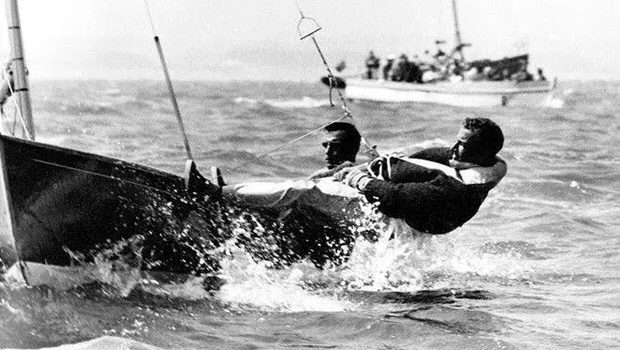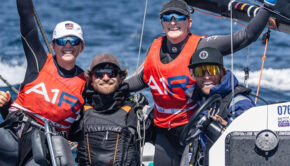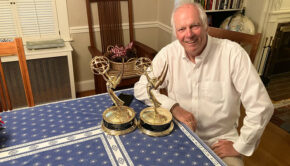Olympics: That was then, This is now
Published on August 11th, 2021
Before Keith Musto set up the sailmaking business Musto & Hyde and the Musto clothing brand, he was a scrappy Flying Dutchman helm that captured a silver medal at the Tokyo 1964 Olympics.
That was Great Britain’s only sailing medal in 1964, and while there was a medal or two at each successive games, it wasn’t until Sydney 2000 when British sailors began dominating the podium as they do today.
In this report by Musto, he reflects on the good old days:
Would I change my era? Certainly not. Would I like to be 25 again and have the chance to race today’s hotshots? Absolutely!
The 1964 Olympics saw what was the last of the amateur, certainly in sailing. Working 8am to 6pm five days a week, circuit training in the evenings, including squash and running, kept us fit and hungry to sail on the weekends.
Using holiday allocation to attend the Nationals, or if selected, the Europeans or Worlds, was a must. Grants from the Royal Yachting Association, if selected, might just pay for your petrol to get you to Europa but nothing more.
Our Olympic campaign in the Flying Dutchman started in 1961 with an old boat which was soft. We had one mainsail, genoa, and spinnaker. We were laughably light, 11 stone (154 pounds) each and short, five-foot nine-inches. That old boat did us proud but clearly would not hold together until the Olympics.
Neither of us had any money but by teammate Tony Morgan was a good chatter. He persuaded two people to fund a new FD which we took possession of in the autumn of 1963. (The Dutch builder was under oath not to say who the boat was for.)
That winter we fitted out and tuned Lady C, including sailing out of sight of anyone to perfect the art of spinnaker reaching with Tony on the wire instead of sitting out with the guy across his chest while holding the sheet! Unbelievable but that was the norm, until we executed the art at the Olympics. That’s another story.
Several good sailors told me they would like to try for the Olympics but could not afford it. We couldn’t afford it either but we found a way because we were hungry. Without that hunger, it is unlikely you will stay the course. The same applies today, be it at a different level. Professional, yes, so what, the challenge is the same to outthink, outwork, and outsail the competition.
Sure, the standards internationally today are higher than 1964, as is the support, which was almost non-existent in 1964. In business, if a company is successful, it’s usually because it has a good product and team behind it. The same goes for the British Sailing Team. This didn’t happen overnight; it started decades ago in the 1970s.
So, what are the British Teams reasons for success?
1. The UK is a relatively small catchment area. Many other countries have similar catchment areas.
2. Dinghy sailing is popular throughout the country.
3. The RYA established a well thought out training program forty years ago which has grown from strength to strength over the years. Supporting funding has always been part of the overall objective.
These are the facts. The challenge for other countries is now to catch up.








 We’ll keep your information safe.
We’ll keep your information safe.